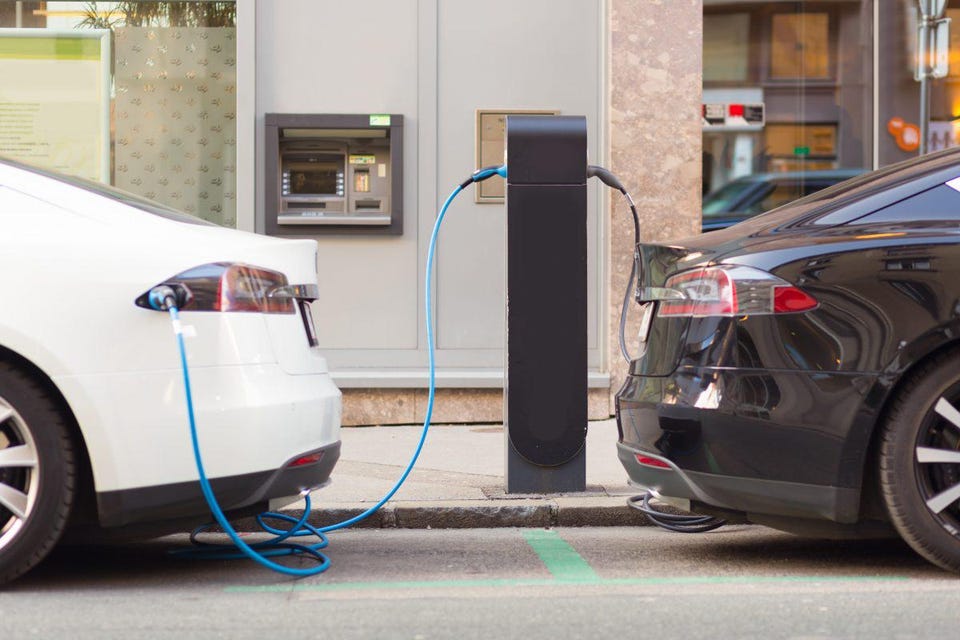
If you're considering buying an electric vehicle, it is worth asking how long it takes to charge the battery. The length of your charging time will depend on several factors, such as the battery capacity, state of charge, charger type, weather conditions, and how long it takes to recharge.
It's likely that the EV charger has the greatest impact on how long it takes to charge your batteries. Some EV models can charge in a matter of minutes while others may take several hours. It is not possible to say how quickly it will take but most EVs can still be charged in less time than a day. Many EVs that are brand new can be charged in a matter of minutes.

Fortunately, EV manufacturers make it easy to have a portable 240 volt charger on hand that you can use when you're not driving. Future EVs will come with faster and more powerful chargers that you can use at home, work, or on the road. Many companies are investing in charging technology. However, it is important that you remember that not all EV charges are created equally. The best chargers will accept most EV types.
Public charging stations offer the best charging options. These stations offer fast charging options and a range of charging types. You can also find charging on the go at hotels, parking garages, and big name national stores. These stations can be used to charge your phone while you travel. The fastest charging station will generally provide between 43 and 50 kW. The most expensive and slowest stations offer less rapid charging.
You may be able charge your battery in as little as five minutes depending on how you charge. However, the actual charging process itself can take as long as twenty minutes. This is due to the fact that your EV model is likely a lithium battery capable of absorbing and discharging more electricity than a few watts. When they are fully charged, the batteries will start to degrade more quickly. As you near the end your drive, your charging duration will continue to decrease.

The optimal charge time of your battery will depend on your EV model, the battery capacity, and your personal preferences. If you are a power junkie, you will probably want to charge your battery in the most efficient manner possible. It is possible to do this by planning your charging schedule and using Level 2, 3 or 4 chargers. These chargers may be used in your home or public place, such as a mall or airport. The ideal battery charge should be done at least once daily, but you can still charge it whenever needed.
FAQ
Is it difficult to become a mechanic apprentice
It's not simple, but you can learn quickly and there are many avenues for advancement.
You must have patience and perseverance. You will also need to be able fix cars, trucks and motorcycles.
Customers and loved ones can place a lot of pressure on you. You shouldn't feel pressured to make decisions that you don't like.
This is a career that you might enjoy if you are passionate about fixing cars. This is a job that allows you to earn a decent income and grow your business.
But you may prefer another path. If this is the case, you might want to become a technician.
This requires you to use your technical expertise in support of other workers. Technical support could include helping technicians to troubleshoot issues or teaching them new techniques.
Another option is becoming a service advisor. Here, you'll provide advice and assistance to customers when they bring their cars to a garage.
The decision you make will depend on what you are looking for. There are many options, so you can choose the one that suits you best.
What is the length of an automotive training course?
An automotive course is three years long.
The first year is spent learning about cars and theory. The second year is spent on practical training where you learn how to drive, fix engines, and do other mechanical jobs around the car. The last year is spent at a local shop, where you will get practical experience with real-world problems.
How do I fix my car for a hobby?
You might be interested in cars as a hobby. It is possible to learn about cars, repair them, purchase parts, or simply enjoy them. It's a fun hobby that you can do if it interests you.
It's not an easy task to make this a full-time job. It takes dedication and hardwork. And you'll need to invest a lot of money too.
It is best to avoid getting involved in car accidents unless you have good reasons.
What does it matter which college I attend?
You're wrong. In terms of getting into the auto industry, there is no distinction between colleges. However, some schools offer better programs than others so if you're looking for something more specialized, look elsewhere.
What are the basics of car mechanics?
You don't need to know anything about cars to work as an auto mechanic. All you need to know is how to fix things. That's why most people start doing jobs like fitting brake pads or changing tires before progressing to more complex repairs.
You'll need the ability to read and understand diagrams and to follow simple rules of good practise. You will also need to understand how parts should be replaced or repaired.
You should not attempt to fix vehicles without proper training and guidance. This is especially true if you deal with expensive components such as engines or transmissions.
Even though you won’t need to know much more about cars, you will still need to have an in-depth understanding of mechanics and physics. This will include understanding the basic principles of engine operation and brake function.
It is also important to remember that you will need to be able to handle many situations. For example, you may find yourself working on a vehicle that has been involved in a serious accident. You will also need to be able to deal with accidents and breakdowns.
It is important to be open to learning new skills quickly. As well as being able to diagnose problems, you'll need to be able to perform simple maintenance tasks such as tightening nuts and bolts.
Is it worth becoming a mechanic?
The answer depends on what you are looking for in life. If money is your goal, then you can answer "yes". But if you are searching for meaning and purpose, then you should not answer this question.
If you don’t possess any mechanics skills, you won’t be able to do it. It will not make you rich. You won't become famous. It is unlikely that your life will change.
This would require you to spend many years learning how to properly do everything. Then you'd still have to pay someone else to fix your car when it breaks down. It's the reason most people don't bother. They find something better to do instead.
To sum up, if you want to earn lots of money then go ahead. If you are looking for a fulfilling life, however, then stay clear of the mechanics' industry.
What qualifications are required to become a mechanic
To become a mechanic, you'll need to pass a series of exams. These include:
-
A general knowledge test
-
A practical exam
-
An apprenticeship test
These tests will ensure you are familiar with the fundamental concepts of mechanics and physics before starting to work as a mechanic.
These tests will allow you to be a mechanic once you have passed them. You will still need to complete an apprenticeship. This will involve training in your trade.
To be able to repair vehicles, you'll need classes or workshops. Additionally, you will need to work with experienced mechanics.
For mechanic success, you'll need to be focused and meticulous. It is essential to pay attention to all aspects of vehicle repairs.
To become a successful mechanic you'll need patience. If you don’t love to follow instructions, this may not the right career path.
If you enjoy cars and fixing them, this job could be a good fit for you.
Statistics
- Apprentice mechanics earn significantly less hourly than mechanics who have completed training, with a median wage of approximately $14.50 an hour, according to PayScale. (jobhero.com)
- According to the BLS, total auto technician employment is expected to exceed 705,000 by 2030. (uti.edu)
- According to the BLS, the median annual salary for automotive service technicians and mechanics in the United States was $44,050 in May 2020. (uti.edu)
External Links
How To
How to protect yourself against auto mechanic frauds
Scamming by auto mechanics is a big problem for consumers. Consumers spend an average of $1,500 annually on repairs to their cars. This means that there are many people out there who are willing to take advantage of this situation. However, if you know what to look for, you can avoid becoming a victim. These tips will help you identify scammers before they steal your money.
-
Never pay upfront. If someone asks you to pay them upfront, it's probably a scam. You should always ask for payment after work is completed. If you have any doubts about whether something is legit, contact the Better Business Bureau (BBB), at 1-888-322-8138. They can provide guidance and assistance.
-
Ask for references. It's a great way to verify that you're dealing directly with a service provider who is trustworthy. Check online reviews. You should ensure that the business you do business with has a good reputation.
-
Do background checks. You should never hire anyone without doing a background check. To check if complaints have been filed against the business, visit the BBB site. Also, make sure that the license number of the vehicle belongs to the owner.
-
Don't be afraid to walk away. Sometimes, even though a business may appear legitimate, they can try to make you pay too much. If you feel that you have been exploited, don't be afraid to walk away. There are plenty of other businesses available to you.
-
Be wary of "free" services. There are many companies that offer free inspections and estimates. These companies usually charge exorbitant fees later. Before agreeing to any agreement, always ask about any additional costs.
-
Avoid being pressured. If a company offers you a great deal it is because they believe they can charge you less than what you are worth. If you feel pressured to purchase something, it is likely that the company is a fraud.
-
Look for quality products. It is important to look for high-quality parts when choosing a repair shop. For example, if you need new brake pads, you shouldn't go to a place that uses cheap pads. Instead, go to a shop specializing in brakes.
-
Get multiple quotes. It is important for you to compare prices among different shops. If you do this, you will have a greater chance of getting a fair deal.
-
Keep track of everything. Keep records of everything that happens during your repair. This includes things such as receipts, invoices, and warranties. Notify your recipient of phone numbers or addresses.
-
Keep updated